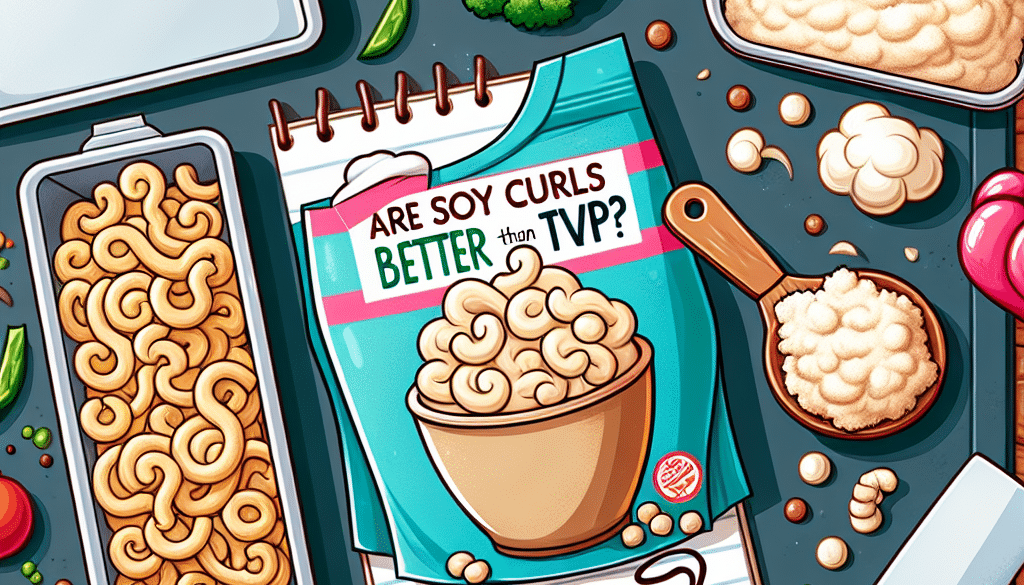Are Soy Curls Better Than TVP?
-
Table of Contents
Soy Curls vs. TVP: Which Plant-Based Protein Reigns Supreme?

As the demand for plant-based proteins continues to rise, consumers are often faced with a variety of options, each claiming to be the best alternative to meat. Among these, Soy Curls and Textured Vegetable Protein (TVP) have emerged as popular choices. But which one is truly better? This article delves into the nutritional benefits, culinary versatility, and environmental impact of both Soy Curls and TVP to help you make an informed decision.
Understanding Soy Curls and TVP
Soy Curls are a whole soy product made from non-GMO, whole soybeans. The process involves cooking, shredding, and dehydrating the beans, which results in a product that closely resembles shredded meat when rehydrated. TVP, on the other hand, is made from defatted soy flour that has been cooked under pressure and then dried. It’s a highly processed food that comes in various shapes and sizes, including chunks, flakes, and granules.
Nutritional Comparison
When it comes to nutrition, both Soy Curls and TVP are excellent sources of plant-based protein. However, there are some differences worth noting:
- Protein Content: Both Soy Curls and TVP are high in protein, but TVP tends to have a slightly higher protein content per serving.
- Fiber: Soy Curls have an advantage in terms of fiber since they are made from whole soybeans, whereas TVP has most of its fiber removed during processing.
- Vitamins and Minerals: Soy Curls retain more of the natural vitamins and minerals found in soybeans, such as iron and calcium, compared to TVP.
- Processing: Soy Curls are less processed than TVP, which may be an important consideration for those looking to consume whole foods.
Culinary Versatility
Both Soy Curls and TVP can be used in a variety of dishes, from stir-fries to soups, and can be seasoned to taste like almost any type of meat. However, their textures and preparation methods differ:
- Texture: Soy Curls have a chewy, meat-like texture that many find more appealing than the sometimes gritty texture of TVP.
- Preparation: Soy Curls need to be rehydrated before use, which can be done quickly with hot water or broth. TVP also requires rehydration but can sometimes take longer to cook, depending on the size of the pieces.
- Flavor Absorption: Both Soy Curls and TVP are excellent at absorbing flavors, but Soy Curls may provide a more satisfying mouthfeel due to their whole soybean composition.
Environmental Impact
The production of both Soy Curls and TVP requires significantly less water and land than raising livestock for meat. However, the environmental footprint of each varies:
- Processing: Since Soy Curls are less processed, they generally have a lower environmental impact compared to the more energy-intensive process required to make TVP.
- Transportation: Both products are lightweight and have a long shelf life, which reduces the environmental impact associated with transportation and storage.
- Sustainability: Choosing non-GMO and organic options for either product can further reduce their environmental impact.
Health Considerations
For those with specific dietary needs or health concerns, the choice between Soy Curls and TVP might be influenced by the following factors:
- Allergies: Both products are made from soy, a common allergen, so individuals with soy allergies should avoid them.
- Additives: TVP often contains added colorings and flavorings, whereas Soy Curls are typically free from additives.
- Whole Foods Diet: Those following a whole foods diet may prefer Soy Curls due to their less processed nature.
Cost and Availability
Cost and availability can also play a role in deciding between Soy Curls and TVP:
- Cost: TVP is generally less expensive than Soy Curls, making it a more budget-friendly option for some consumers.
- Availability: TVP is widely available in most health food stores and online, while Soy Curls might be harder to find and often require purchasing from specific retailers or directly from the manufacturer.
Conclusion: Weighing the Pros and Cons
In conclusion, both Soy Curls and TVP offer unique benefits and drawbacks. Soy Curls are less processed, have a more natural nutrient profile, and a texture that many find preferable. TVP, on the other hand, is more affordable, has a higher protein content, and is widely available. Ultimately, the choice between Soy Curls and TVP will depend on individual preferences, dietary needs, and environmental considerations.
Discover ETprotein’s High-Quality Protein Products
If you’re looking for high-quality plant-based proteins, ETprotein offers a range of products that cater to various dietary preferences and needs. Their selection includes organic rice protein, pea protein, and a variety of seed proteins, all characterized by a neutral taste and non-GMO, allergen-free attributes. With L-(+)-Ergothioneine purity over 98%, ETprotein’s offerings are ideal for those seeking premium protein sources for their nutritional supplements or food products.
About ETprotein:
ETprotein, a reputable protein and L-(+)-Ergothioneine (EGT) Chinese factory manufacturer and supplier, is renowned for producing, stocking, exporting, and delivering the highest quality organic bulk vegan proteins and L-(+)-Ergothioneine. They include Organic rice protein, clear rice protein, pea protein, clear pea protein, watermelon seed protein, pumpkin seed protein, sunflower seed protein, mung bean protein, peanut protein, and L-(+)-Ergothioneine EGT Pharmaceutical grade, L-(+)-Ergothioneine EGT food grade, L-(+)-Ergothioneine EGT cosmetic grade, L-(+)-Ergothioneine EGT reference grade and L-(+)-Ergothioneine EGT standard. Their offerings, characterized by a neutral taste, non-GMO, allergen-free attributes, with L-(+)-Ergothioneine purity over 98%, 99%, cater to a diverse range of industries. They serve nutraceutical, pharmaceutical, cosmeceutical, veterinary, as well as food and beverage finished product distributors, traders, and manufacturers across Europe, USA, Canada, Australia, Thailand, Japan, Korea, Brazil, and Chile, among others.
ETprotein specialization includes exporting and delivering tailor-made protein powder and finished nutritional supplements. Their extensive product range covers sectors like Food and Beverage, Sports Nutrition, Weight Management, Dietary Supplements, Health and Wellness Products, and Infant Formula, ensuring comprehensive solutions to meet all your protein needs.
As a trusted company by leading global food and beverage brands and Fortune 500 companies, ETprotein reinforces China’s reputation in the global arena. For more information or to sample their products, please contact them and email sales(at)ETprotein.com today.














